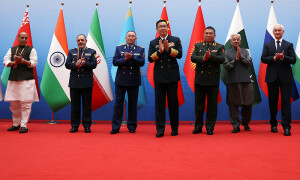AS recent events have shown, Pakistan continues to face considerable internal security challenges, particularly acts of terrorism perpetrated by militant groups in KP and Balochistan.
The military’s media wing said on Thursday that 12 terrorists had been neutralised in both provinces over the past few days. However, the counterterrorism operations have come at a high cost, as a number of security men were martyred in various incidents.
These include four troops in North Waziristan, who lost their lives while confronting “Indian-sponsored” khawarij (the term the state uses for the banned TTP), as well as the loss of two Coast Guard men in Jiwani, who were reportedly attacked by militants near the Iranian border. These vulnerabilities must be plugged to prevent the loss of more troops.
There had been some media reports that an Afghan Taliban commander had apparently issued a warning to fighters against attacking Pakistani forces and launching self-styled jihad. Attributed to an individual named Saeedullah Saeed, the warning stated that fighting Pakistan would be considered fasad (corruption) rather than jihad.
The veracity of this statement is hard to establish. Even if we were to assume that the statement had been made, the warning has not had its intended effect, as the continuing TTP terrorist attacks inside Pakistan show. What is needed from the Afghan Taliban are firm commitments that they will not let their territory be used for staging attacks against Pakistan.
This principle had been clearly enunciated at the trilateral meeting of Afghanistan, Pakistan and China’s foreign ministers in Beijing earlier this month. Summarising the main points of the meeting, Chinese Foreign Minister Wang Yi had said that the three participants had agreed “to oppose all forms of terrorism … and … jointly combat terrorist forces of concern to each side”.
Perhaps Islamabad and Beijing need to remind Kabul of this commitment. Hopefully, Pakistan’s elevation of diplomatic relations with Afghanistan to ambassadorial level should help improve matters.
Regarding Balochistan, ties with Iran are largely cordial, so both sides must reinforce CT cooperation. As for the larger problem of Baloch separatist militancy, CT efforts must be carried out in tandem with a political process to address Balochistan’s challenges.
Beating terrorism requires proactive engagement with foreign friends and neighbours, as well as internal security efforts and intel operations to bust terrorist cells. While hostile actors in the region may well be supporting terrorist groups, Pakistan must remain vigilant to thwart fresh threats.
The key remains blending kinetic efforts with sociopolitical interventions to address immediate terrorist threats and the underlying factors that fuel militancy. Pakistan succeeded in thwarting foreign aggression, and with resolve the domestic terrorist threat can also be neutralised.
Published in Dawn, May 31st, 2025










































